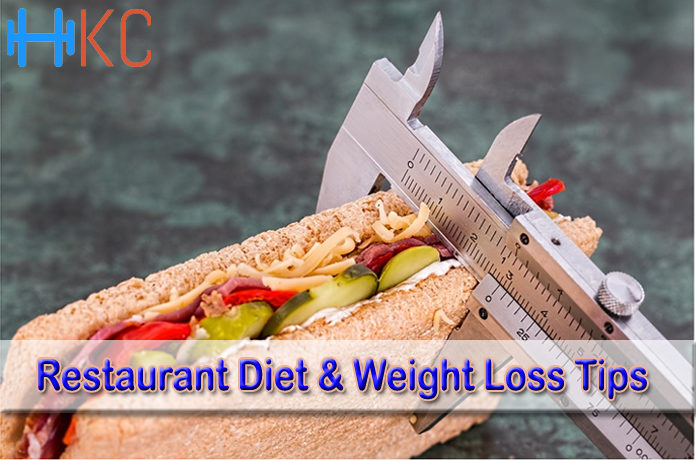How to Make Healthy Choices While Eating Out
Love to eat out, but trying to lose weight and eat a healthier diet? Here are some suggestions to help you make good choices as a restaurant.
Can you eat out when you’re trying to lose weight? Of course, but you need to be careful. Restaurant portions are out of control, and it’s often hard to know exactly what the nutritional value is of a restaurant meal. Many chain restaurants publish the calories, fat, and nutrition data of their products on their websites. However, many do not, and it’s rare for non-chain restaurants to have this information available.
Here are some tips for making your restaurant meal as diet-friendly as possible,
Ask for a Doggie Bag at the Beginning of the Meal
Your server may look at you like you’re crazy. But if the portion is way too big, this is a great way for you to control your serving and avoid overeating. Put everything in the doggie bag except for a reasonable sized portion, which you should leave on the plate and enjoy. Don’t be too chintzy with yourself, or you’ll be tempted to go into the doggie bag and take more.
Order Food Family-Style
Many restaurants serve “entrees” that are easily big enough to serve two or more hungry people. If this is the case, order one entree and share. Chances are that there will be plenty to eat– and if you’ve underestimated, you can always order more.
Order Condiments and Fattening Foods on the Side
You can always ask your server to omit fattening choices like sour cream, salad dressing, butter, and hollandaise sauce. However, if these are things you love, you can control your portion by asking for these things on the side. This will allow you to dip your food in your fattening condiments instead of pouring it on top. You might find that a few tablespoons are perfectly satisfying.
Substitute Healthier Condiments and Sauces
If your entree comes with condiments that are unhealthy, ask to replace them with something with less fat and fewer calories. If you’re not sure what substitutes will work, ask your server for advice. Here are some unhealthy condiments to avoid, and some healthier substitutes.
Unhealthy Condiments and Sauces:
- Hollandaise sauce
- Gravy
- Full fat sour cream
- Full fat salad dressing
- Full fat mayonnaise
- Butter
- Full fat cheese
- Cream
- Maple syrup
- Tartar sauce
- Alfredo sauce
- Carbonara sauce
- Peanut sauce
- Oil
Healthier Condiments and Sauces:
- Mustard
- Ketchup
- Marinara sauce
- Salsa
- Cocktail sauce
- Vinegar
- Low-fat salad dressing
- Low-fat sour cream
- Low-fat cheese
- Low-fat mayonnaise
- Yogurt
- Chutney (in moderation)
- Fresh fruits and vegetables
Substitute a Salad
Even if they don’t say so on the menu, many restaurants will allow you to order a salad– or another healthy option–in place of french fries and other fattening side dishes. You may be charged a little extra, but probably not much.
Substitute Whole Wheat Options
As often as possible, ask for whole wheat bread, pasta, rice, and other products. This will cut down on calories and add quite a bit of nutritional value. In addition, whole wheat products often are more filling and can help prevent overeating.
Drink Water
Drinking lots of water is good for everyone, and it can help speed up your weight loss. It can also fill you up a bit and prevent you from overeating. Even if you’re drinking something else, ask for a glass of water as well, and be sure to drink as much of it as you can.
Ask Your Server for Suggestions
Some servers are much more knowledgeable and helpful than others. But if you’re unsure what to order, give your server a chance and ask for recommendations on the lighter menu selections.
Enjoy Yourself
For many people, eating out is a pleasurable experience, and if you deny yourself this entirely, it will be harder to stay on track and stick to your diet. Treat yourself to a night out, and enjoy it. Eat as carefully as you can, but don’t beat yourself up if you eat a little too much. Remember, weight loss is much easier if you change your lifestyle, so get into the habit of eating out in a manner that’s more healthful.
Tips for Getting in Shape for Women Over 50
Although it’s harder to lose weight once you’ve passed through menopause, you can still do it. It just takes more time.
Losing weight isn’t easy regardless of your age. Once you pass menopause, it’s even harder. However, you can still lose weight even after menopause. It just takes longer.
Post-Menopausal Women
About two out of three post-menopausal women battle extra pounds, with the average weight gain anywhere from 10 to 15 pounds. And, if they don’t gain weight, they still have a harder time maintaining their former weight before they went through menopause.
Belly Fat Bulge
Where younger women battle pounds mostly around the hips and thighs, excess pounds tend to gravitate around the stomach for middle aged and older women. Unfortunately, it can creep up at the rate of about a pound a year.
Reduce Calorie Intake
Because you need fewer calories to sustain your former body weight, it’s necessary to reduce the number of calories you consume each day.
Weight loss programs such as Weight Watchers are excellent for helping you learn to eat within a certain calorie range. Rather than counting calories, Weight Watchers uses points in their Flex Plan, as well as offering an alternate Core Plan. The beauty of the program allows you to live life and not feel deprived. Instead of thinking of yourself on a diet, consider it’s a lifestyle. You just learn how to eat moderately and make wiser choices.
What’s more, you can find others your age at the meetings where you can share tips and recipes, besides encouraging one another.
Exercise More
Increase your exercise routine. In addition to firming your body, consistent exercise also promotes good bones and a healthier heart. And, it improves your frame of mind as endorphins are released during exercise. Regular exercise reduces your chances of diseases including diabetes, high blood pressure, heart disease, and osteoporosis.
Walking-Start out walking as much as you’re able to walk. Then increase it as you continue your fitness program. Home treadmills are excellent if you don’t want to invest in a gym membership. If you don’t like to walk alone find a walking buddy or join other seniors who walk on a regular basis.
Weight Training-As women are prone to undergo osteoporosis following menopause, weight lifting can be beneficial because it strengthens bones and makes them denser. Also, as you age muscle tissue shrinks by about 30 percent. This is another reason why working out with weights is beneficial.
Women especially tend to suffer from osteoporosis after menopause. Weight lifting helps keep bones stronger. By following the proper steps of weight training, you can lose fat.
Stay Focused
When you were younger, you could probably get away with playing around with your weight loss program. However, your body is less forgiving as you age, so there’s less room for waffling back and forth, half-committed. Therefore, it’s vital that you stay focused on your goal of losing weight when tempted to backslide.
Set Mini Goals
If you have a lot of weight to lose, it can be overwhelming to dwell on your goal weight when you first start your food program. Instead, set mini-goals. For example, strive to lose 10 percent of your weight at a time. Then, after you’ve accomplished that objective, aim for the next 10 percent of weight loss.
Finally, be patient. If you stick to your food plan and exercise regularly, you will burn calories and lose fat. However, it takes more time when you’re older, so don’t give up. The extra time it takes to lose weight is worth it because you’re worth it.














